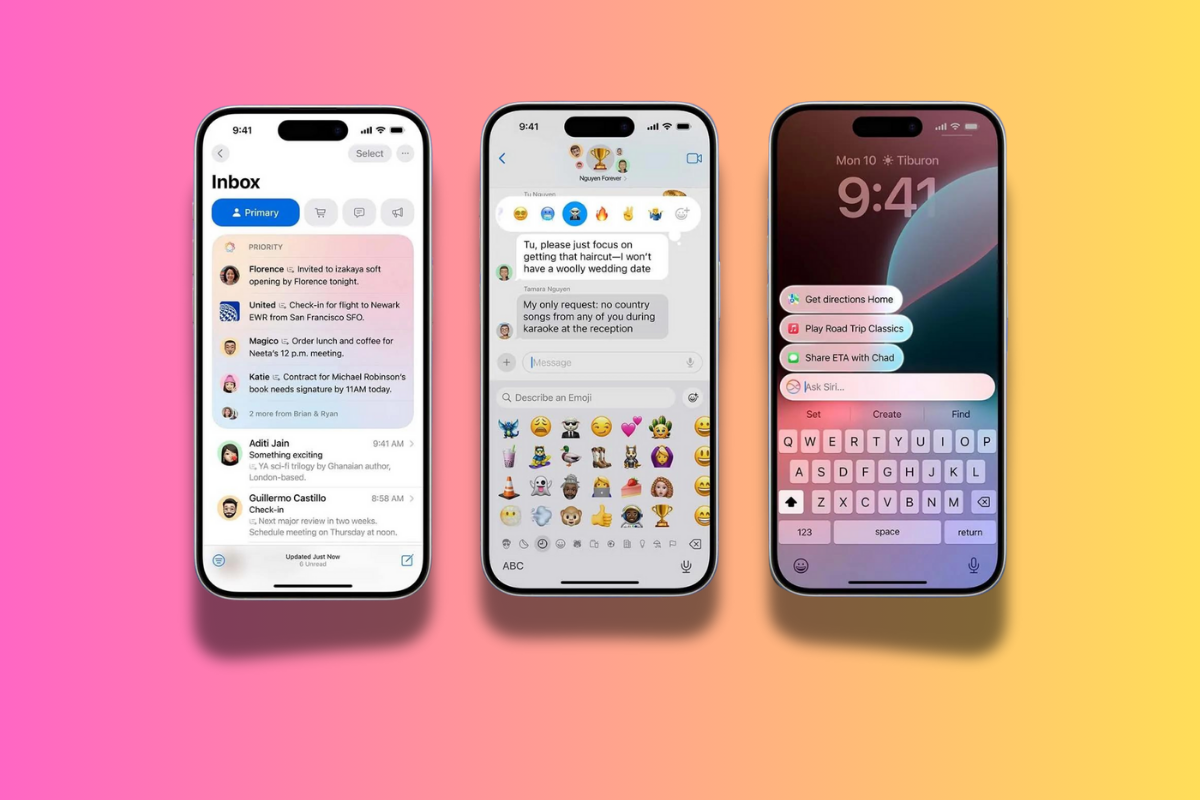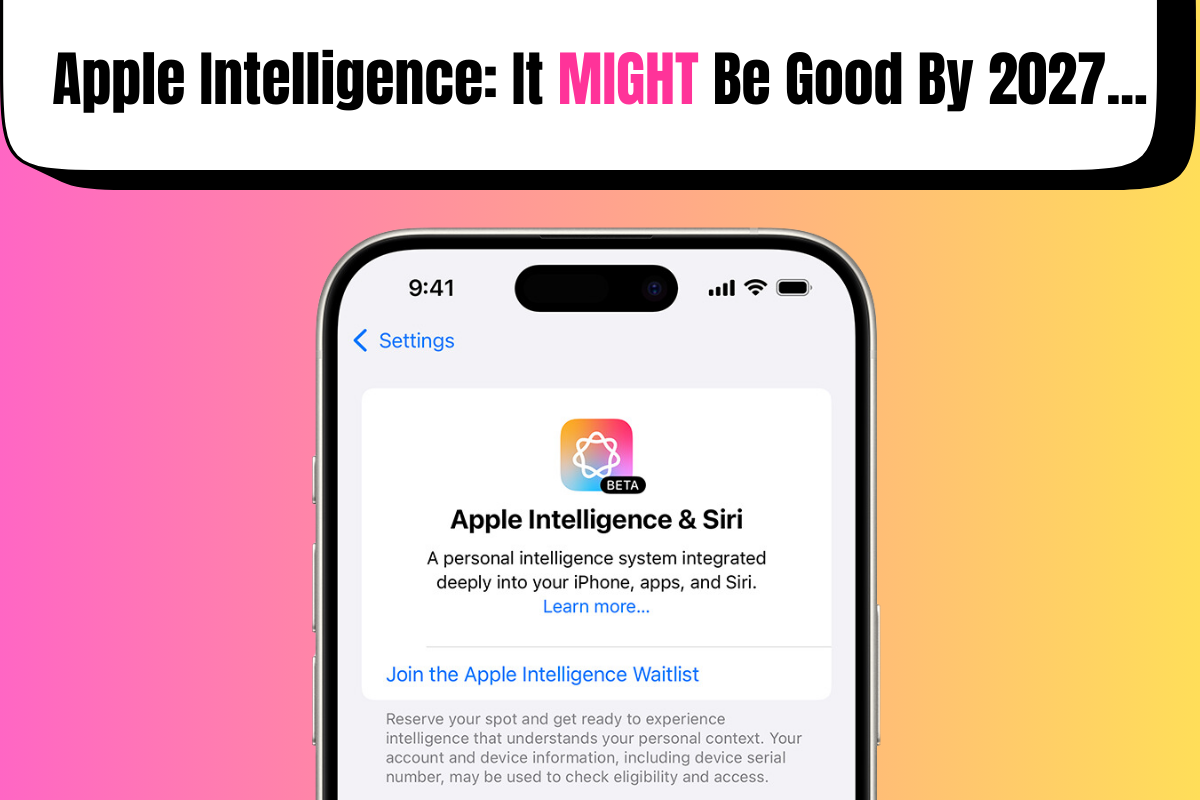Apple Intelligence is apparently something of a long-game. How long? It’ll be another few years before it can do anything truly novel…
TL;DR – Apple’s AI Long Game Will Take YEARS To Play Out…
- 📈 Apple is planning a major AI leap, but we’ll have to wait until 2026/2027 to see it happen.
- 🤖 Analyst Lee says Apple has an advantage because it’s the only player with integrated hardware and software, enabling low-cost, personalized AI services.
- 🔧 Current smartphones need a hardware overhaul before they can handle “serious AI,” hence the delay.
- 🏭 Apple’s partnership with Taiwan Semiconductor could give it a long-term edge over Android competitors in tech and cost development.
- ⏳ While Apple takes its time, Android manufacturers are pushing AI features but may lack the same integration depth.
AI is all anybody can talk about right now. It is also Big Tech’s ticket to prolonged growth and ever-rising share prices for the next decade.
As phone sales wane (iPhone 16 demand is lower than expected, for instance) with more and more people holding onto their iPhones and Android phones for longer, AI came around just at the right time for firms like Google and Apple.
Google’s approach to AI has been prolific; it has outfitted its latest smartphones – the Pixel 9 series – with a plethora of genuinely useful AI features and capabilities, culminating, at least for me, in the outstanding Pixel 9 Pro XL.
Even With Apple Intelligence’s Delay & Limited Capabilities, Analysts Are Still Bullish Over Apple’s AI Plans
Apple’s approach has been a little more, well… slow and protracted. Apple Intelligence, the iPhone 16’s big, new feature, is delayed and we won’t even get its most basic features until iOS 18.2 in March 2025.
As ever, though, it would appear that Apple is more keen on the long game than keeping up with the Jones’ (the Jones’ in this context would be Google)…
According to analyst Lee, “We like Apple Intelligence long term, as Apple is the only hardware-software integrated player that can leverage proprietary data to offer low-cost, personalized AI services.”
In plain English, Apple’s unique position with both hardware and software gives it a leg up in the AI game.
And the main USP it has? The ability to reduce the costs associated with running AI models on a large scale.
Currently, this is something even OpenAI is struggling to manage.
Documents show that OpenAI expects about $3.7 billion in yearly sales for 2024, and estimates that its revenue will grow to $11.6 billion next year.
However, the company expects to lose roughly $5 billion this year after paying for operational costs, salaries and overhead, the report said. The company has been circulating the documents with potential investors ahead of an upcoming funding round that could value it at $150 billion – source
Apple’s AI Will Be Different From OpenAI – And That’s A Problem…
But here’s the REAL kicker: our current smartphone hardware isn’t up to snuff for the kind of “serious AI” Apple’s aiming for.
This means that despite all of Apple’s claims that it “built” the iPhone 16 series with Apple Intelligence at its core, we likely won’t have an iPhone that can truly do AI until the iPhone 18 or later.
True to the general way of things in 2023/24, Apple seems to have used AI as a marketing tool to boost sales of its iPhone 16 series, all the while knowing full well that Apple Intelligence’s true potential is years away.
Lee mentions that “smartphone hardware needs rework before being capable of serious AI, likely by 2026/27.”
So, if you were hoping for an AI revolution in your pocket tomorrow, you’re out of luck. We’ve got a few years to go before our devices can handle what’s coming.
Apple Has “Long-Term” Advantage Over Android With AI Implementation
Still, Lee argues that Apple has a longer-term advantage over its Android-based competitors, particularly given its partnership with chipmaker Taiwan Semiconductor.
This collaboration could be the secret sauce that propels Apple ahead in the tech and cost development race. While Android manufacturers are busy playing catch-up, Apple might be quietly setting the stage for a major AI leap.
Now, let’s not get too ahead of ourselves. Apple has a history of taking its sweet time to perfect things—remember how long it took for them to embrace widgets? But when they do roll something out, it’s usually – although not quite as usual as it used to be – polished to a shine.
Apple Intelligence Will Be Essentially Useless Until 2027

The idea that we’ll have to wait until 2026 or 2027 might be a bummer, but if it means getting AI that’s actually integrated seamlessly into our devices, it could be worth the wait.
In the meantime, Android isn’t sitting still. OEMs like Samsung et al are pushing boundaries with AI features, but without that tight hardware-software integration Apple boasts, they might hit a ceiling sooner rather than later.
AI is expensive in its current guise, a fact even OpenAI cannot get around. Apple’s plans seem to be focussed on a way to make the mass rollout and usage of “proper AI” cheaper.
Google appears to be the only company that can truly match Apple in this context with its Pixel line of smartphones. But even in this instance, Google’s control over Pixel isn’t quite as white-knuckled as Apple’s is with iOS and Android.
And then there’s the whole privacy thing: Google’s hybrid model with AI allows for a blend of on-device and cloud processing. But to actually work, Gemini requires access to user messages for context, potentially compromising end-to-end encryption in messaging apps.
Google also has to think about its hardware partners in Android, for instance, and while it does design its own phones and chips now, like Apple, it is still a good few years behind Apple in both departments.
What does this mean? The AI you were sold in 2024 isn’t up to scratch. BUt better AI is coming… soon. Bottomline? You haven’t heard the last from the Big Tech AI hype train. Choo bloody choo!


